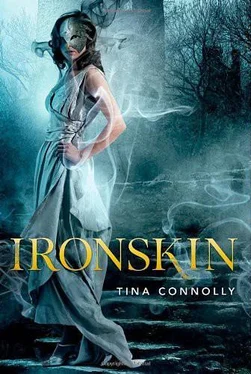Jane was used to adjusting the alignment of the mask without really looking at herself. It was not her disfigured side that made her throat clutch and her anger rise; it was her good side. The reminder of how she should look. If she turned her profile to the mirror she could imagine her face whole again, as she hadn’t seen it since sixteen, when her life was normal and full of possibility. But that luxury was too costly. The times she gave into those imaginings, she wept, after, and was unsettled and resentful for days.
So Jane glanced just enough to see that every bit of the scarring was hidden by the cold iron. Rage, she had told Mr. Rochart. Rage was her curse, and it coiled on her cheek, suffused her soul. But at least the iron stopped it from leaking to other people. She had not known that she was cursed, at first. There were so few survivors, and each of them stranded at different understaffed city hospitals, far from their country homes. Besides, when everyone was angry, afraid, miserable—who knew that the effects were emanating from these scarred people who refused to heal? So she hadn’t known, until an ironskin came through the hospitals, searching for people like her, and sent her to the foundry.
But she knew how she looked. She’d known that since the moment it happened.
Jane turned from the mirror and set off to find Dorie.
* * *
Jane found Dorie sitting on the kitchen floor. Oddly, there seemed to be more sunlight down here than in some of the upstairs rooms. In the edges of the ceiling there were skylights that let light in somehow—perhaps with mirrors? Jane seemed to recall that as a feature of fey building. Regardless, the thin sunlight was an improvement over blue-tinged chandeliers and sconces.
The cook was stirring a soup pot and flicking through an old magazine, clearly read many times. She was thick and sturdy, with reddened face and arms, and grey-blond hair that escaped in curling wisps from her faded cap. Her name was Creirwy, which is perhaps why she went by Cook.
Dorie was on the floor, tracing the square tiles with the palm of her hand. When Cook wasn’t watching, Dorie painted the tiles with patterns of light. When Cook caught the blue flash out of the corner of her eye, she said warningly, “Dorie…,” and the lights disappeared.
Cook looked up and caught Jane’s eye. “Oh, and you must be the new one,” she said. She left her soup long enough to clap Jane a friendly and floury pat on the shoulder. “I’m Cook.”
“I’m Jane. Jane Eliot.”
“Jay,” said Dorie, jumping up. Her white frock was smudged with jam.
“Miss Trouble is having that good of a day,” said Cook. “It’ll last a bit, if you’re clever with her. She got some lunch in her belly just now. I’ll be sending Martha with your tea in the late afters, but are you needing a bite now? Sure, and you haven’t had lunch, have you? Sit down, lass, and eat right now.”
Jane’s stomach was vast with hunger. The sunlight fell on a half-empty jar of sliced peaches on the sill, on a dented tray of buns cooling on the stone counter. Yeasty steam scented the air. She had been too nervous to eat when she left the city at dawn—though a half-awake Helen had tried to make her eat a toasted stale crumpet—and she wasn’t sure she could do much better now. Besides, she was clattery with anticipation to try working with Dorie straight off, to see what it was like, to see what her new life would be. “No thank you,” she said, resolutely turning away. “I’d rather get started with Dorie.”
She reached down for Dorie’s hand but Dorie eluded her, backing away and crossing her arms behind her back.
“Sure and she doesn’t like to be touched,” Cook said over her shoulder. “I’ll be sending buns up with you. Wouldn’t do anybody good to have you fainting.” She packed several buns in a little basket with a chunk of sausage and a wedge of white cheese.
Jane withdrew her hand and looked soberly at Dorie. Chalk up the first thing she wasn’t going to push on Day One. “Will you lead the way, then?” she said.
Dorie smiled sideways up at her in the manner of children everywhere when they’d gotten away with something. Perversely, it comforted Jane to see a behavior she could label. Dorie scooted sideways through the door and set off down the hall, Jane after.
Cook followed the two of them out into the hall, chattering about how the sourdough hadn’t been rising as it should, the early spring lettuce wasn’t coming quick enough, and entertainment wasn’t the same since the tech for the blue-and-white films died and you never saw the matinee idols anymore. Local talent on a hastily built stage just wasn’t the same as a lusty star-crossed clinch from Fidelio and Frida, now was it? Not that Jane would know, as that was nearly ten years ago now, and Jane probably hadn’t given tuppence for a good romance as a child. Despite Cook’s complaints, her casual manner was a welcome relief from the pervasive gloom of the rest of the house. She dropped two pieces of wax-wrapped taffy from her apron pocket into the basket and handed it to Jane.
“Thank you,” said Jane, and she turned for the stairs.
But Cook grabbed her arm. “You won’t be taking those stairs,” she said. “Those will be going to the master’s studio.”
Jane looked in surprise at the stairs—and then, at the identical staircase at the other end of the room. “Oh,” she said. “All right.” She could not tell if Cook was cross or just curt. And what would there be to be cross about?
Dorie scampered down the hall and led Jane up the correct stairs, away from Cook.
Cook watched them until they were out of sight.
* * *
Dorie knew the proper way back to her rooms, and she liked stomping. Another positive trait in a child—Jane wondered how long she would treasure every disobedience as proof of humanity. Not that gleefully stomping up the stairs was particularly disobedient, but it was a normal behavior that parents expected governesses to put a stop to.
Jane just followed.
She thought back to her first day as a governess in the city. She was not quite seventeen; her mother had died a few months before, and with her, her small living. A neighbor had taken Helen in to let her complete school (in exchange for their cow, which amused Jane on the days she could find something to laugh about) and Jane found herself being pushed from the safety of the foundry. The Great War was over and the soldiers were slowly coming home, attempting to reclaim their former lives. War-scarred Jane was finally, begrudgingly, given a place with a long-ago friend of the family’s. They had three children, nine, seven, and four, and the first day Jane spent doing nothing but playing ring around the rosy and sardines with them until they were used to her strange face and would let her touch them and tickle them and tuck them in at night.
Jane didn’t think any amount of playing sardines would help with Dorie.
She sat down on the neatly swept floor by the white bed and watched her charge, hoping that by familiar association she would get used to Dorie. Sardines would have been helpful for the governess this time, she thought ruefully.
Dorie stood in the center of the room, looking intently up at the corner of the silver-papered ceiling. Her arms were slightly away from her sides. She clacked her tongue thoughtfully.
The hairs on the back of Jane’s neck pricked up. “Dorie?” she said calmly. “Are you looking at something?”
Dorie turned and smiled. “Mother was there,” she said.
“Mother?” said Jane. “Your doll?”
By way of answer Dorie looked around for the doll. It was hanging off the bed, arms limply flopping down the sides. The instant her gaze fell on the doll it rose in the air and began swimming around the room.
Читать дальше












